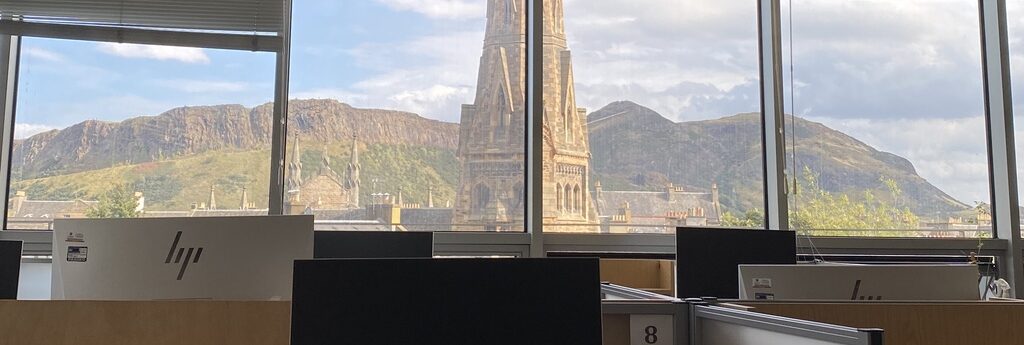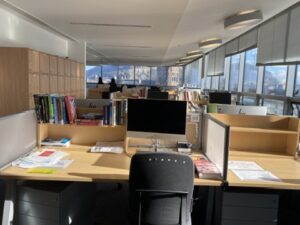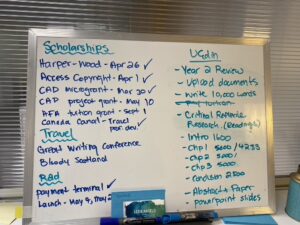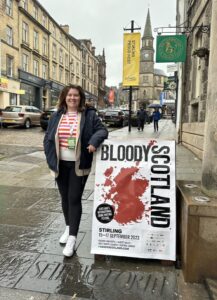What’s it like doing a PhD in creative writing at the University of Edinburgh?

Starting the PhD
I came into my PhD program not really knowing much about what a PhD really was. I knew the basics of my program. Write a 70,000 word novel and a 20,000 word critical reflexive. But I didn’t really know what else I was supposed to be doing. When doing a postgraduate program by research (as Edinburgh refers to it) you will arrive to discover that there are no classes. No schedule. And just a rough idea of what you are supposed to be researching.
The supervisor relationship
My primary supervisor is Dr Jane Alexander. At the University of Edinburgh, certainly in creative writing, the PhD application isn’t directed to any one specific supervisor. Applications come in and if you’re chosen, your supervisor gets allocated to you. So Jane and I became a team by chance, and although I had met her previously in my master’s program, we were tasked to set foot on this adventure together. Jane and I meet roughly every month, and I send chunks of my work to her about a week in advance so she has time to read it and make comments. We generally work around each other’s schedules, and in my first year, I would prepare agendas to discuss certain topics. In our first meeting, I shared my approach that I believed the mentee was responsible for driving the relationship, and so I book our meetings and manage the calendar of our appointments. I also take notes in our meetings and incorporate feedback into my subsequent work.
My secondary supervisor, Dr Jane McKie, only formally checks in with me at my annual progress review. She taught me during my master’s as well, and is pretty familiar with my work. We’ve had a few coffee chats, or meet ups over drinks outside of the PhD “formal programming” but these are social occasions and aren’t about driving forward any specific agenda.
Some of the things I chat about with my supervisors outside of my writing include:
- Teaching courses (including the different approaches in the UK versus Canada)
- How to write an abstract
- What a call for papers is
- How to attend a conference and what to do once I get there
- Submitting funding requests
- Preparing references for scholarship applications (kudos to Jane for doing a lot of these for me)
- Potential job opportunities
What I do all day
In my first year, my days were spent trying to figure out what exactly I was supposed to do. I went around in circles, attempting to follow my original project idea, changing my mind, moving to something else, before I eventually settled on doing exactly what I had proposed in the first place. I read various articles, books I thought might be relevant, and dug around for resources at the library. I read a fair amount of Ian Rankin, Louise Penny, and skimmed other crime novels and ultimately ruled them out. My supervisors let me meander through this exercise, which I think is common in the first year, before I gained traction in my second year.
Now, I have a solid idea of what I’m doing. I alternate between writing my novel draft, and my critical reflexive. I’m still finding relevant and new research, but this is a focused exercise and I’m not flailing around (as much) and going down unrelated rabbit holes. I’m at the start of my third year, and my manuscript is essentially at the word count, but now I’m editing it. Editing looks like ripping out a distracting storyline, re-aliving a character, and removing other characters.

The postgraduate room in 50 George Square
I spend most of my time writing in the dedicated post-graduate room at the University of Edinburgh located on the fourth floor of 50 George Square, or working in a co-working space in Canada. I had a weird start to my PhD in that I started during the pandemic, so about a third of my degree was done remotely due to restrictions on international travel. I can’t write in my own home, so that means I’m either in dedicated workspaces, cafes, or the stereotypical Starbucks. The university library is too crowded and too hot, so I avoid it.
How I keep track of it all
I keep a whiteboard of everything I am supposed to do, including my word count on my critical reflexive, my upcoming scholarship deadlines, call for paper deadlines, and potential grants. I also have a physical agenda where I note deadlines for publications I was to submit to, events I want to attend, or workshops offered by the university. I take notes in a spiral bound book and in my OneNote binder.

My whiteboard
Things I do besides writing
The magic of the University of Edinburgh, and the city in general, is that there is always something going on. Some of the things I like to do are:
- Take academic workshops on topics like blogging (hello!), attending conferences, editing a thesis, etc.
- Go to open mics and do readings of my work
- Attend events put on by the writer in residence, this year we have Michael Pederson and he is fabulous.
- Prepare abstracts to submit to conferences
- Check in with my friends who are also doing PhD’s and share how far behind we are (or try to team up and submit to conferences together)
- Go to book launches and support the local scene
- Explore Edinburgh and check out various pubs, comedy nights, and performances (it’s a very artsy city)

Attending the Bloody Scotland crime writing conference in Stirling
Not every PhD student has the same experience – some are on campus everyday, working diligently with piles of books and papers everywhere. Some come to campus only for their meetings, while others work full-time and do a mix of in-person and remote meetings. I was forced to do a lot of my work from Canada, which was honestly fine (and in some ways easier), but now that the university campus is back to normal and everything is open, it is nice to be on campus more.
Have any questions about doing a creative writing PhD? Put them in the comments below!
(Credit: Lexie Angelo, 2024)
(Credit: Lexie Angelo, 2024)
(Photo Credit: Ryan Angelo, 2023)




How many workshops are you required to take? I am in the process of applying and my partner and I decided to try and attend University somewhere in the UK/Scotland. We are avid outdoor enthusiasts and want to live somewhere where i can still attend the university, but enjoy the Scottish outdoors.
The course schedule for the master’s degree includes three classes per week, and one of those is a workshop. The PhD is all independent research, and you are expected to meet with your supervisor once per month. There are no formal workshops for the doctoral students, although there are many events and workshop groups in Edinburgh that you can join.